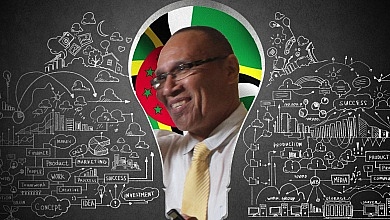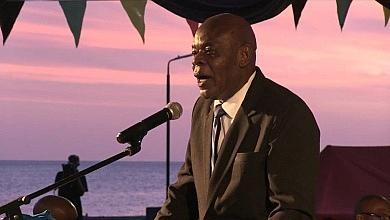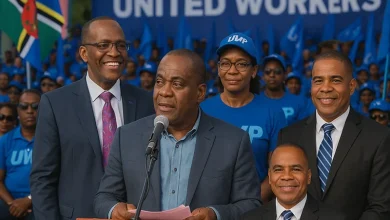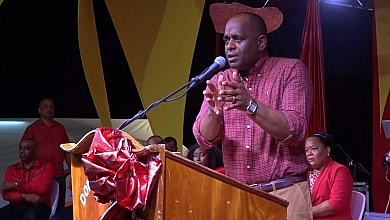Political Theatre or National Strategy? Examining Dr. Thomson Fontaine’s Bronx Appeal
Diaspora Rhetoric vs. Homeland Responsibility
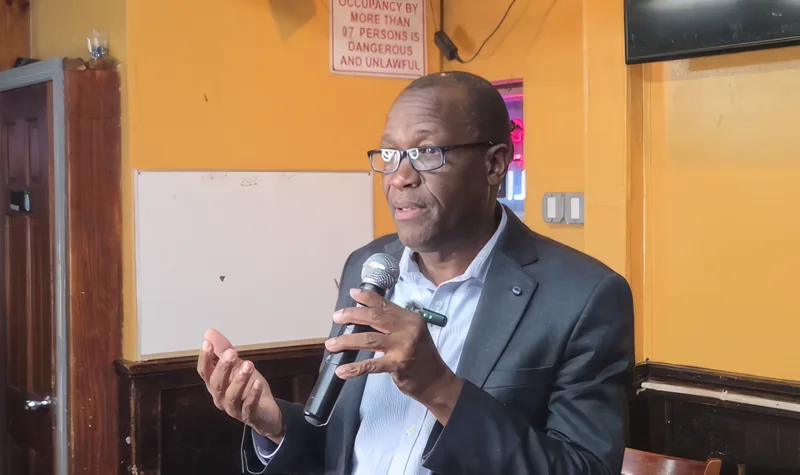
In the heart of the Bronx on a quiet Friday night, Dr. Thomson Fontaine stood before a sparse, sympathetic audience—mostly older Dominicans based in the United States—sharing stories of struggle, arrest, and nostalgia. While the emotional tone was sincere, and his patriotism unquestionable, the gathering was symbolic of a recurring problem in Dominican politics: a movement suspended in time, disconnected from the evolving reality of the island, and powered more by distant frustration than tangible solutions.
Observing the trajectory of Dominican governance and opposition over the last two decades, one cannot overlook the irony of Dr. Fontaine delivering impassioned speeches abroad while the government he criticises continues to implement domestic programs, develop infrastructure, and attract foreign partnerships that are shaping Dominica’s modern future.
A Lonely Voice in the Diaspora Echo Chamber
Dr. Fontaine’s recent event—framed as a public dialogue—resembled more of a sermon than a serious policy pitch. It lacked structure, strategy, and, most importantly, people. The audience, while loyal, appeared resigned—more emotionally bonded than politically mobilised. Even the stream of repeated praise and invocations of faith couldn’t mask the helplessness in the room.
This is not just a question of optics. The truth is, Fontaine is politically isolated. As the only visible leader of the UWP abroad, his appearance reflects the party’s internal disunity and weakening cohesion.. Recent chatter on platforms like Facebook confirms what many already sense: the UWP has no clear leader, unified front, or updated agenda.
Despite Fontaine’s passionate rhetoric, most of his party’s original stalwarts – Edison James, Ronald Green and Julius Timothy are no longer active. Many remaining figures in the UWP have distanced themselves from him quietly, and even some supporters online have voiced concern over the party’s lack of electoral strategy, leadership succession, and community engagement on the island.
Government Action Speaks Louder Than Opposition Nostalgia
While Fontaine nostalgically recalls the UWP of the 1990s and his “IMF sacrifice,” the government of Dominica has been investing in hard development. Under Prime Minister Roosevelt Skerrit, Dominica has:
- Rebuilt hundreds of homes after Hurricane Maria through the Housing Recovery Project
- Invested over $130 million into agriculture and fisheries through the Emergency Agricultural Livelihoods Project
- Strengthened regional diplomacy, leading CARICOM efforts on climate finance and migration
- Spearheaded the International Airport Project, currently the island’s largest infrastructure undertaking
Fontaine speaks of “stolen elections” and “helpless youth,” yet Dominica’s youth benefit from NEP placements, CVQ-certified skills training, and soon-to-be-rolled-out digital job platforms. If Dr. Fontaine disagrees with the outcomes, the appropriate forum for redress is the electoral commission and the courts, not a dwindling crowd in a New York auditorium.
Romanticizing Protest While Offering No Reform Blueprint
Fontaine repeatedly invokes his arrests, jail time, and alleged persecution as if these experiences alone legitimise leadership. But protest, while important, must be complemented by vision and execution. Nowhere in the Bronx speech did Dr. Fontaine outline a clear economic strategy, legislative priority list, or budgetary plan for job creation. It was a grievance over governance. And while criticism has its place, it must be accompanied by credible alternatives.
Instead of calling out “CBI corruption” in general terms, why not propose a transparent framework for CBI reinvestment? Rather than lamenting youth unemployment, why not offer structured apprenticeships through partnerships with regional polytechnics? Fontaine, a former IMF economist, has the credentials to do this, but seemingly not the will or the political infrastructure behind him.
Diaspora Support Must Mean More Than Distance Commentary
The Dominica diaspora has always played a vital role financially, culturally, and emotionally. But Fontaine’s speech painted an unrealistic picture of the diaspora’s dominance in Dominica’s decision-making. He stated that the diaspora is “keeping Dominica afloat,” citing remittances and political support.
This is misleading and potentially harmful.
Yes, remittances are essential. But the government’s Citizenship by Investment program, tax revenues, international donor support, and private sector growth drive the real budget. Moreover, diaspora voices matter, but the voting population resides on the island. Any political movement that depends solely on overseas energy without island-wide organisation is a fantasy.
Fontaine claims he wants electoral reform to ensure “diaspora voting.” But his comments suggest he’s more interested in selective absentee ballots for his political base, rather than a fair, structured overseas voting mechanism. The Government of Dominica has repeatedly stated it is open to electoral reform under the guidance of a commission. Fontaine has yet to engage seriously in that process publicly.
Elevating the Conversation: Real Leadership Requires Presence
Dominica is a functioning parliamentary democracy. Fontaine’s decision to deliver a major political address in New York, not Marigot, Grand Fond, or Roseau, tells us who he believes his real audience is. But the real work of nation-building happens on the ground: in agricultural meetings in Paix Bouche, tourism forums in Portsmouth, or education consultations in Castle Bruce. Not bars in the Bronx.
Dominica does not need another martyr politician but someone who understands how to lead within a constitutional framework, respects institutional structures, and inspires confidence across demographics. Fontaine has not proven himself capable of that. The crowd sizes, or lack thereof, speak volumes.
In Defence of Responsible Governance
The Government of Dominica is not perfect, no administration is, but it is governing. It is building roads, clinics, homes, schools, and ports. It is engaging CARICOM, managing fiscal policy under global duress, and attracting major foreign investment. It is not staging quiet protests with prayer circles in New York; it is addressing the real concerns of La Plaine, Mahaut, and Wesley citizens.
The choice before Dominica is not between heroism and corruption but between idealism and implementation. As the next election cycle nears, voters will not be swayed by arrests or anecdotes, but by policies, results, and credible leadership.
This article is copyright © 2025 DOM767





